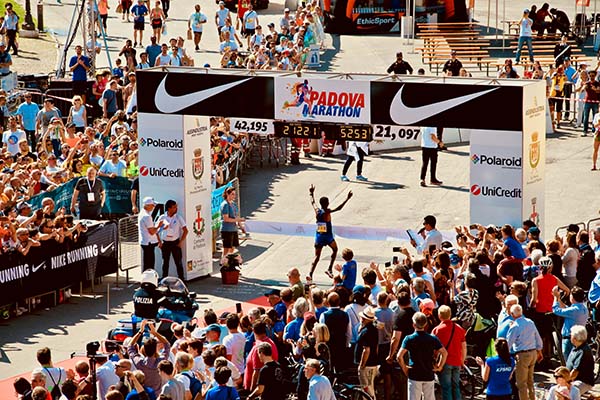Running a half-marathon? Yeah, that’s no joke! It takes some serious effort, determination, and maybe just a little bit of stubbornness. So, what’s a decent time for in a half-marathon? Honestly, it varies based on a bunch of factors like your training, your age, and what goals you have got in mind.
When I first laced up my running shoes, I couldn’t even handle 2km without feeling like I was about to pass out. But little by little, I worked my way up to 10km, and man, that felt like I was scaling a mountain! A half-marathon still seems like a massive jump for me, but just looking at how far I’ve come keeps me going.
If you’re curious about where you might fit in, or where you could aim for, here’s a straightforward rundown on half-marathon times based on your running experience.
Newbies: Just Finish It!
If you’re just starting out, aiming to cross the finish line in 2:30 to 3:00 hours is a great goal. Forget about speed for now; it’s all about pacing yourself and proving you can finish. When I kicked off my running journey, I didn’t even care about the clock, it was way more about making it through without gasping for air every couple of minutes. Take it chill and enjoy the ride.
Intermediate Runners: Time to Step It Up
If you’ve been putting in the miles for a while, finishing in 2:00 to 2:15 hours is a solid challenge. By now, you’re probably on some training plan with longer runs, speed work, and maybe a few hill workouts mixed in. This is when running starts feeling less like a struggle and more like a game; you’re figuring out your pace and when to give it that extra push.
Experienced Runners: Go For It!
If you’re a seasoned runner, shooting for under 1:45 is the goal. These folks love tackling those hill sprints and probably have a go-to pair of racing shoes for this kind of stuff. At this level, it’s not just about making it to the finish; it’s about cutting off those seconds wherever you can. It’s tough, but the thrill of finishing strong totally makes it worth it.

Age and Gender Benchmarks
So, let’s be real, your half-marathon time isn’t just about how tough you train. Factors like age and gender can definitely play a role, so here’s a rough idea of what you might see.
Age Groups
If you’re in your 20s or 30s, you’re probably looking at finishing around 1:40 to 2:00 hours. That’s the prime time for your body, and hitting those speeds can feel easier. As you hit your 40s and 50s, that average creeps up to about 2:00 to 2:20 hours. While endurance typically becomes more important than speed as you age, you can still smash your goals, lots of older runners impress with their times!
Gender Differences
Generally speaking, men tend to finish quicker than women. Men usually wrap up around 2:00 hours, and women are more in the 2:15 hours range. But here’s the kicker: your training routine and how consistent you are matter way more than these average numbers. Your effort always trumps generic data.
These benchmarks are just a jumping-off point. The real victory? Seeing your own improvement, no matter where you start.
What Affects Your Half-Marathon Time?
So, what makes the difference between a good finish and a tough race? It’s a mix of factors, some you can influence and some you just gotta deal with.
Training Consistency
If there’s one thing that can really impact your time, it’s how regularly you train. Sticking to a balance of long runs, tempo workouts, and easy recovery days helps your body get used to it all. When I started, sticking to a routine was key in going from barely managing 2km to easily completing 10km. Week after week, your body adjusts to the challenge.
Endurance and Fitness Levels
Long runs help you build stamina, and speed sessions boost your pace. Throw in some cross-training or strength training, and you’ll be strengthening those muscles that keep injuries at bay. This combo doesn’t just get you across the finish line; it helps you get there feeling really solid.
Race Day Conditions
Things like the weather, the course setup, and even the crowd can really change your time, for better or for worse. A sunny, hilly day? Probably gonna slow you down. Flat course with cool temperatures? You’re in for a treat! Training in different conditions can help you get ready for whatever race day throws at you.
Some aspects are under your control, like your training and how you recover, while other things, like the weather on race day, are out of your hands. So, what’s the best plan? Set flexible goals, stay prepped, and be ready to adapt. That’s how you keep making progress.

How to Improve Your Half-Marathon Time
Getting faster at a half-marathon isn’t rocket science, but it does take grit, patience, and smart training. Whether you’re aiming to shave off a few minutes or completely crush your personal best, here are some ways to level up:
Go All Out with Intervals
Intervals are like the spice of running, they might sting a bit, but they make everything better. You sprint hard, recover, then do it all over again. It’s tough, it’s sweaty, and it’s wildly effective. Think of it as teaching your legs to fire on command, even when they’re tired. Two sessions a week? Total game-changer.
Longer Runs, Stronger Legs
Here’s the deal: running longer than the race distance is like building extra stamina insurance. Tackling 14 or even 15 miles in training doesn’t just prepare your body, it tricks your mind into thinking 13.1 miles is no big deal. And that’s the secret to confidence at the start line.
Fuel Like a Pro
No gas in the tank? You’re not going anywhere. Getting your nutrition dialed in is crucial. Try different energy gels or snacks on your training runs, trust me, you don’t want to figure out mid-race that your stomach hates your energy bar. Pro tip: carbs are your best friend on long runs.
Rest Like You Mean It
Here’s something most people forget: rest days aren’t slacking off, they’re when your body rebuilds stronger. Skip them, and you’re risking burnout, injuries, and slower progress. I used to think taking a day off was lazy, but now? Rest days are sacred.
Popular Time Goals
Every runner’s chasing something, here’s a breakdown of the most common targets:
Crack 2 Hours
This is the Holy Grail for so many runners. It’s doable, but you’ll need consistency: long runs, tempo workouts, and a steady pace come race day. Hitting that final sprint and seeing 1:59 on the clock? Pure euphoria.
The Coveted 1:45
Aiming for 1:45 is no joke. You’ll need to train smarter, not just harder, mixing speed drills with recovery runs. It’s not for the faint of heart, but hitting this time is a badge of honor.
Sub-1:30 or Bust
This is next-level. We’re talking elite territory. It takes high mileage, laser-focused intervals, and a mental game as strong as your legs. If you’re shooting for this, you already know, it’s all about discipline.
Wrapping It Up
Your half-marathon time is personal. It reflects your journey, your work, and your grit. Maybe you’re chasing that sub 2:00, dreaming of 1:30, or just determined to finish strong. Wherever you are, every mile matters.
Keep chasing those goals, but don’t forget to celebrate how far you’ve come. From that first shaky 2km to wherever you are now, it’s your story, and it’s worth every single step.
Ready for your next challenge? Try a sprint triathlon or even an Ironman 70.3.





